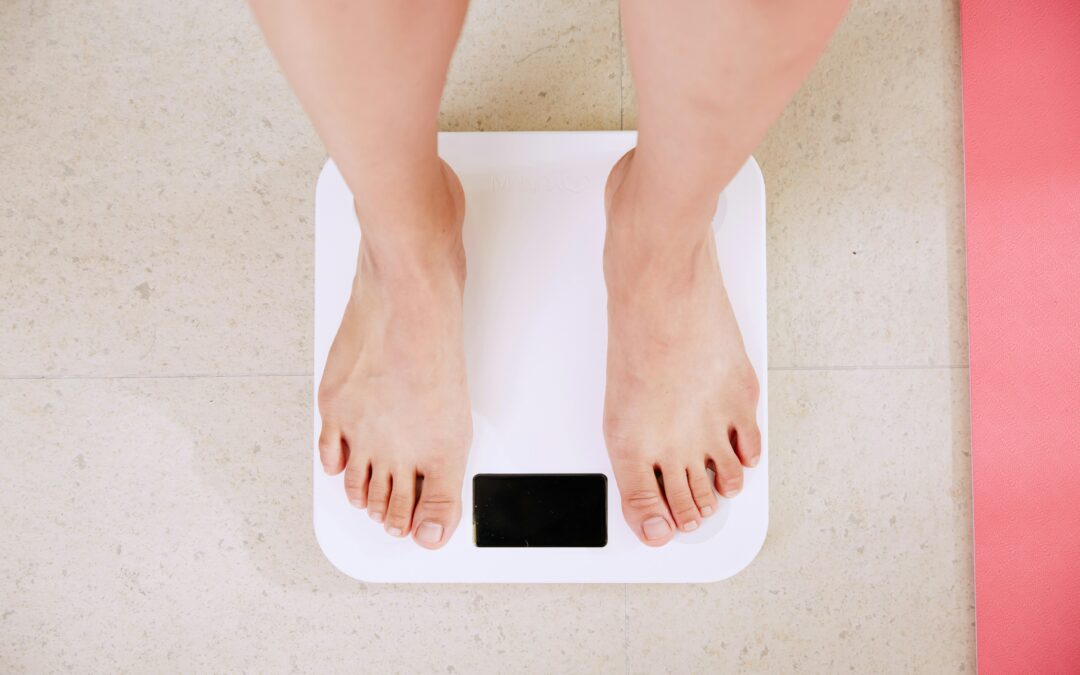One question that I hear often from women with endometriosis is, “ will endometriosis cause weight gain?” The simple answer is no. Endometriosis does not directly cause weight gain.
However, my approach as a functional nutritionist is to view the body as an interconnected system, where imbalances in one area can affect the whole.
We’ll explore why weight gain can still be a common side effect of endometriosis and look at some of the underlying factors involved.
Will endometriosis cause weight gain: Why inflammation matters
To understand how endometriosis might connect with weight gain, it’s important to grasp the inflammatory nature of the disease. Endometriosis involves the growth of endometrial-like tissue outside the uterus, which is intimately connected with chronic inflammation.
This chronic inflammation puts stress on your body and can impact many of your body’s day-to-day processes.
For example, chronic inflammation has been shown to impact how your body manages blood sugar. When your body is inflamed, it can contribute to insulin sensitivity, which is a condition where your cells don’t respond to signals from your body regarding blood sugar. This can in turn lead to increased fat storage and difficulty in losing weight.
Additionally, your body’s stress response to chronic pain and inflammation can trigger the release of cortisol, your main stress hormone. Excess cortisol production is associated with weight gain, particularly around the abdomen.
Hormonal imbalances and weight gain with endometriosis
It is widely accepted that endometriosis is closely linked with hormonal imbalances, particularly involving estrogen. Estrogen dominance, where the level of estrogen is relatively high compared to progesterone, is a common occurrence in women with endometriosis. Estrogen promotes fat storage.
Pain and physical activity
The chronic pain that so often comes with endometriosis can significantly impact your ability to stay active. Pain and discomfort during physical activity can lead to a more sedentary lifestyle.
This ends up being a bit of a hampster wheel because then reduced physical activity contributes to weight gain but also exacerbates other symptoms of endometriosis by decreasing circulation and increasing inflammation.
It can be challenging to get started, but incorporating at least some gentle movement like yoga, walking, and swimming can be supportive of circulation, stress levels, and weight management without contributing to pain.
The impacts of stress
Living with a chronic condition like endometriosis can take a significant emotional toll, as so many endo warriors know. As we talked about earlier, stress triggers the release of the stress hormone cortisol, which can lead to increased abdominal fat.
Stress can also lead to comfort eating or emotional eating. So often the comfort foods we turn to are high-calorie, nutrient-poor foods that contribute to weight gain. It’s important to look not just at diet, but to practice stress management techniques and seek out further support when you need it. No one should handle endo alone!
Nutritional strategies for endometriosis
From a holistic perspective, managing weight with endometriosis involves addressing inflammation, hormonal balance, and overall well-being through diet.
Here are some key strategies:
1. Anti-inflammatory diet: Focus on consuming anti-inflammatory foods such as fresh fruits and veggies, fatty fish, poultry, meat, eggs, nuts, and seeds. These foods can help reduce the chronic inflammation associated with endometriosis.
You will also want to avoid some of the more inflammatory foods like vegetable/seed oils, sugar, and processed foods.
Check out my free endo diet guide for more support!
2. Balancing hormones: Support healthy hormone balance through diet. This includes consuming adequate fiber, which helps with the elimination of excess estrogen. Cruciferous vegetables like broccoli, cauliflower, and kale are especially helpful with estrogen dominance.
3. Healthy fats: Include sources of healthy fats, particularly omega-3s. Sources include fatty fish like salmon, walnuts, chia seeds, and flax seeds. These fats support hormone production and can help reduce inflammation.
4. Hydration: Simple, but underrated! Staying well-hydrated is crucial for endo warriors. Water supports healthy digestion and elimination of toxins and excess hormones and so much more!
5. Mindful eating: Practice mindful eating to develop a healthier relationship with food. This involves paying attention to hunger and fullness cues, eating without distractions, and savoring each bite.
The role of supplements
In addition to dietary changes, certain supplements can support women with endometriosis in managing their weight and overall health:
1. Omega-3 fatty acids: These have potent anti-inflammatory effects and can be beneficial in managing the inflammation associated with endometriosis.
2. Magnesium: This mineral can help reduce menstrual pain and improve mood, making it easier to stay active and maintain a healthy weight. Magnesium glycinate is the form I recommend most for endo warriors.
3. Vitamin D: Many women with endometriosis have low levels of vitamin D, which is important for immune function and inflammation regulation. Look for vitamin D3 alongside K2 and be sure to consume it along with fat for optimal absorption!
4. Probiotics: A healthy gut microbiome is essential for overall health. Probiotics can improve digestion, reduce inflammation, and support a healthy weight.
Lifestyle adjustments
Beyond diet and supplements, lifestyle changes play a crucial role in managing endometriosis and supporting a healthy weight:
1. Regular exercise: Engage in regular, gentle exercise that does not worsen your symptoms. Yoga, pilates, and walking are excellent choices, but what I recommend most is finding what actually works for you and that you enjoy.
2. Stress management: Incorporate stress-reducing practices into your daily routine. Meditation, deep breathing exercises, and spending time in nature can help manage stress levels.
3. Adequate sleep: Ensure you get enough quality sleep each night. Poor sleep can disrupt hormonal balance and increase stress levels, both of which can contribute to weight gain.
4. Support networks: Connect with support groups or communities of women who understand what you’re going through. Sharing experiences and tips can be incredibly beneficial.
Personalize your approach
Every woman with endometriosis is unique and has unique needs. Figuring out what works best for your unique body when it comes to diet, lifestyle, and more can be life changing for endo warriors. Working with a professional can help identify specific food sensitivities, nutrient deficiencies, and lifestyle factors that might be contributing to weight gain and other endo symptoms.
For example, some women with endometriosis might have gluten or dairy sensitivities, which can exacerbate inflammation and contribute to bloating and weight gain. Identifying and eliminating these triggers can make a huge difference.
The mind-body connection
It’s so important to recognize the profound connection between your mind and body. Chronic pain and weight gain can take a toll on mental health, and vice versa. Holistic approaches such as acupuncture, massage therapy, and chiropractic care can support overall well-being and help manage the symptoms of endometriosis.
Practices like mindfulness meditation can improve mental clarity and emotional resilience, making it easier to stick to healthy habits. By nurturing both the mind and body, women with endometriosis can achieve better overall health and well-being.
So, will endometriosis cause weight gain?
While endometriosis itself may not directly cause weight gain, the inflammation, hormonal imbalances, chronic pain, and psychological stress associated with the condition can contribute to weight management challenges.
By taking a holistic approach that addresses diet, lifestyle, and emotional well-being, women with endometriosis can better manage their symptoms and maintain a healthy weight.
I believe in the power of a balanced, individualized approach to health. By focusing on nutrient-dense foods, regular movement, stress management, and supportive therapies, you can take control of your health and improve your quality of life.
It is important to mention here too that while diet and lifestyle changes can take you a long way, sometimes there is a need to dig deeper. One thing that I see frequently in my practice is women having an underlying thyroid issue that can also be contributing to weight gain. Be sure to have a full thyroid panel done regularly through your doctor or a functional practitioner to check in on how things are looking.
Remember, it’s about creating a sustainable, nurturing environment for your body to thrive despite the challenges of endometriosis.
About the author:

Alyssa Chavez is an endo warrior turned functional nutritionist. She supports fellow endo warriors through Thrive With Endo, her 1:1 program and The Endo Warrior Circle, her monthly membership program. She helps women get to the root of their symptoms like pain, fatigue, bloating, infertility, and more so they can feel great in their bodies again.
Work with Alyssa 1:1 to support weight gain with endo and more
The Endo Warrior Circle Membership
More posts you might enjoy:
-
Ep. 95: Where Woo Meets the Work
You’re doing everything right. You’re eating well, taking the supplements, doing all the “right” things, but something still feels off. In this episode, I’m sharing the deeper reason why that might be happening and what finally helped me break through my own healing plateau. We’ll be checking out where the woo meets the work. […] -
Ep. 94: Welcome to Aligned to Rise
Big news, my friend! This podcast (and my entire brand) just got a powerful glow-up. In this episode, I’m announcing the official rebrand from Endo Belly Girl to Aligned to Riseand sharing what this next chapter is all about. You’ll hear why this shift is happening, what I’ve been working on behind the scenes, and how […] -
Ep. 93: Tired? Here’s What to Eat About It
In Part 2 of our fatigue series, we’re diving into how to actually support your energy through food, based on what your labs are telling you. If you listened to last week’s episode and thought, “Okay, cool… but now what do I do with this?”—this is your answer. Whether your iron is low, your thyroid feels sluggish, […]
References:
Esposito K, Giugliano D. The metabolic syndrome and inflammation: association or causation? Nutr Metab Cardiovasc Dis. 2004 Oct;14(5):228-32. doi: 10.1016/s0939-4753(04)80048-6. PMID: 15673055. Retrieved from: https://pubmed.ncbi.nlm.nih.gov/15673055/
Hewagalamulage SD, Lee TK, Clarke IJ, Henry BA. Stress, cortisol, and obesity: a role for cortisol responsiveness in identifying individuals prone to obesity. Domest Anim Endocrinol. 2016 Jul;56 Suppl:S112-20. doi: 10.1016/j.domaniend.2016.03.004. Epub 2016 Mar 31. PMID: 27345309. Retrieved from: https://pubmed.ncbi.nlm.nih.gov/27345309/
Vannuccini S, Clemenza S, Rossi M, Petraglia F. Hormonal treatments for endometriosis: The endocrine background. Rev Endocr Metab Disord. 2022 Jun;23(3):333-355. doi: 10.1007/s11154-021-09666-w. Epub 2021 Aug 17. PMID: 34405378; PMCID: PMC9156507. Retrieved from: https://www.ncbi.nlm.nih.gov/pmc/articles/PMC9156507/
Brown LM, Clegg DJ. Central effects of estradiol in the regulation of food intake, body weight, and adiposity. J Steroid Biochem Mol Biol. 2010 Oct;122(1-3):65-73. doi: 10.1016/j.jsbmb.2009.12.005. Epub 2009 Dec 24. PMID: 20035866; PMCID: PMC2889220. Retrieved from: https://www.ncbi.nlm.nih.gov/pmc/articles/PMC2889220/
Sanyal D, Raychaudhuri M. Hypothyroidism and obesity: An intriguing link. Indian J Endocrinol Metab. 2016 Jul-Aug;20(4):554-7. doi: 10.4103/2230-8210.183454. PMID: 27366725; PMCID: PMC4911848. Retrieved from: https://www.ncbi.nlm.nih.gov/pmc/articles/PMC4911848/





